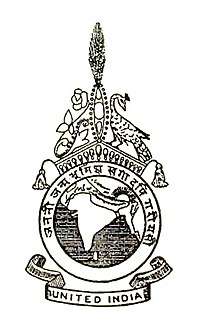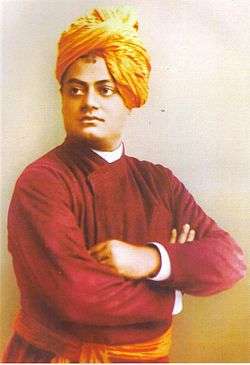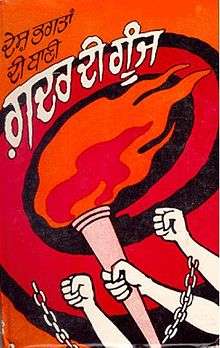Bhupendranath Datta
Bhupendranath Datta (4 September 1880 – 25 December 1961)[1] was an Indian revolutionary and later a noted sociologist and anthropologist. He associated Rishi Aurobindo in his political works. In his youth, he was closely associated with the Jugantar movement, serving as the editor of Jugantar Patrika till his arrest and imprisonment in 1907. In his later revolutionary career, he was privy to the Indo-German Conspiracy. His elder brother was Swami Vivekananda. The Asiatic Society today holds the Dr. Bhupendranath Datta memorial lecture in his honour.
Bhupendranath Datta | |
|---|---|
শ্রী ভূপেন্দ্রনাথ দত্ত | |
.png) Sri Bhupendranath Datta | |
| Born | Bhupendranath Datta 4 September 1880 Kolkata |
| Died | 25 December 1961 (aged 81) Kolkata |
| Nationality | Indian |
| Education | New York University, Brown University, University of Hamburg |
| Occupation | Revolutionary, Freedom Fighter, Biological Anthropologist |
| Known for | brother of Swami Vivekananda |
Notable work | 1.Baishnaba sahitye.(in Bengali)
2.Bharatera dvitiya svadhinatara samgrama: Aprakasita rajanitika. (in Bengali) 3.Bharatiya samaja-paddhati. (in Bengali) 4.Dialectics of Hindu ritualism. 5.Studies in Indian Social Polity 6.Swami Vivekananda, Patriot-prophet: A Study |
| Political party | Jugantar , Ghadhar Party |
| Movement | Indian Independence Movement |
| Parents |
|
| Relatives | Swami Vivekananda (12 January 1863 - 4 July 1902) , Mahendranath Datta (1 August 1869 - 15 October 1956). (both elder brother),Sarnabala Devi (1860 - 16 February 1932) (elder sister),Vishwanath Datta(father),Bhubaneshwari Devi(mother),Durgaprasad Datta(paternal grandfather),Raghumani Basu(maternal grandmother). |
Datta was a writer too. He wrote several books on Indian culture and society. He wrote a book named "Swami Vivekananda, Patriot-prophet".
Early life and education

Datta was born on 4 September 1880 in Kolkata (then known as Calcutta). His parents were Vishwanath Datta and Bhuvaneshwari Datta. He had two elder brothers Narendranath Datta (later known as Swami Vivekananda) and Mahendranath Datta. Vishwanath Datta was an attorney of Calcutta High Court and Bhuvaneshwari Devi was a housewife.[3] Datta was enrolled in Ishwar Chandra Vidyasagar's Metropolitan Institution from where he passed entrance examination. In his youth, he joined Brahmo Samaj led by Keshub Chandra Sen and Debendranath Tagore. Here he met Sivanath Sastri who deeply influenced him. Datta's religious and social beliefs were shaped by Brahmo Samaj which included belief in a caste-less society, in a single God and revolts against superstitions.[4]
Revolutionary activities
In India
Datta decided to join Indian independence movement, and joined Bengal Revolutionary Society formed by Pramathanath Mitra in 1902. In 1906 he became the editor of the newspaper Jugantar Patrika. This newspaper was the mouthpiece of the Revolutionary Party of Bengal. In this period he became a close associate of Sri Aurobindo and Barindra Ghosh.[5]
In 1907, Datta was arrested by British police with the charge of sedition and was sentenced to one year's imprisonment.[4][6]
In USA
After release in 1908 he left India for the United States. After his arrival, he stayed at the "India House" for a while.[4][6] He finished his post-graduate studies and obtained an M.A. degree from Brown University.[6]
In Germany
Datta joined Ghadar Party of California and there he studied about socialism and communism.[4] During World War I, he went to Germany and started revolutionary and political activities there. In 1916 he became the secretary of Indian Independence Committee in Berlin.[6] He remained the secretary of this organisation till 1918. He took memberships of German Anthropological Society in 1920 and German Asiatic Society in 1924.[4]
In 1921 Datta went to Moscow to join Comintern. Manabendra Nath Roy and Birendranath Dasgupta also attended this year's Comintern. During the Datta presented Vladimir Lenin a research paper on political condition of contemporary India. He obtained a doctorate degree in Anthropology from the University of Hamburg in 1923.[4]
Back in India
Then he returned to India and decided to join Indian National Congress.[6] He became members of Bengal Regional Congress in 1927—28 and All India Congress Committee in 1929. In the annual conference of Indian National Congress organised in Karachi in 1930, he proposed a fundamental right for Indian farmers and had it accepted by Congress Committee led by Jawaharlal Nehru. He chaired two All India Trade Union Congress' annual conference. He was arrested for his political activities.[4]
Literary works
Datta wrote books on different subjects like sociology, history, politics etc. He was a linguist and wrote books in Bengali, Hindi, English, German, Iranian. Few of his notable books are—[4]
- Baishnaba sahitye samajatattva (in Bengali). 1945. ASIN B0000CR4M4.
- Bharatera dvitiya svadhinatara samgrama: Aprakasita rajanitika itihas (in Bengali). 1983. ASIN B0000CR5R2.
- Bharatiya samaja-paddhati (in Bengali). 1983. ASIN B0000CR5CO.
- Dialectics of Hindu ritualism. 1950. ASIN B0000CQWOM.
- Studies in Indian Social Polity. Nababharat Publishers. 1983. ASIN B0000CQASU.
- Swami Vivekananda, Patriot-prophet: A Study. Nababharat Publishers. 1954. ASIN B0000CR0OQ.
References
- Chaturvedi, Badrinath (2 June 2006). Swami Vivekananda: The Living Vedanta. Penguin Books Limited. pp. 444–. ISBN 978-81-8475-507-7. Retrieved 4 June 2013.
- Narasingha Prosad Sil (1997). Swami Vivekananda: A Reassessment. Susquehanna University Press. pp. 73–. ISBN 978-0-945636-97-7. Retrieved 1 July 2013.
- P. R. Bhuyan (1 January 2003). Swami Vivekananda: Messiah of Resurgent India. Atlantic Publishers & Dist. pp. 4–6. ISBN 978-81-269-0234-7. Retrieved 1 July 2013.
- Sangsad Bangla Charitabhidhan Volume I. Balgla Sangsad.
- Richard Sisson; Stanley A. Wolpert (1 January 1988). Congress and Indian nationalism: the pre-independence phase ; [rev. versions of papers presented at an international conference, held in March 1984 at the University of California, Los Angeles]. University of California Press. pp. 64–. ISBN 978-0-520-06041-8. Retrieved 1 July 2013.
- Indian History. Allied Publishers. 1988. pp. 3–. ISBN 978-81-8424-568-4. Retrieved 1 July 2013.


